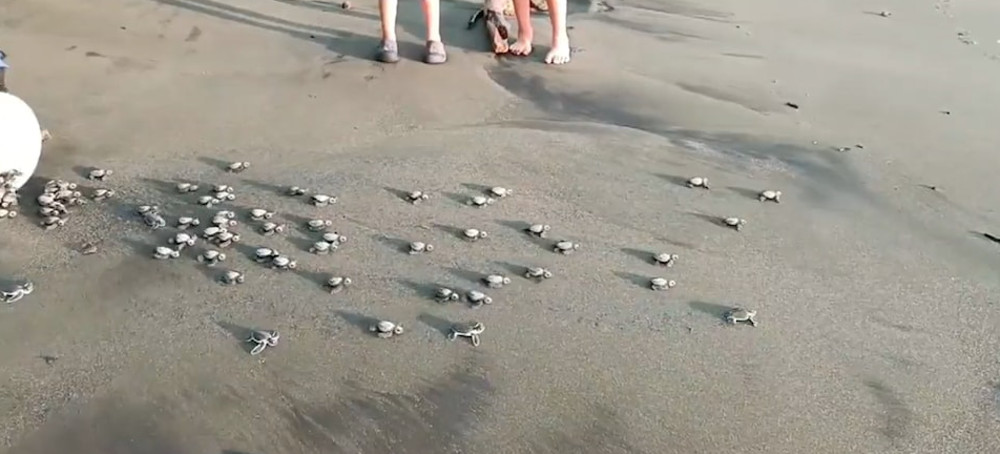 Costa Rica’s National Coast Guard released baby
turtles on Nov. 18 in Punta Banco de Pavones after recovering the
reptiles from poachers. (photo: Storyful)
Costa Rica’s National Coast Guard released baby
turtles on Nov. 18 in Punta Banco de Pavones after recovering the
reptiles from poachers. (photo: Storyful) 22 November 23
22 November 23
Michael J. Coren The Washington Post
But they still face daunting odds, including entanglement in nets, habitat destruction and worsening climate change
A mass abduction on an idyllic beach in Costa Rica has concluded with happy endings — 736 of them.
Poachers snatched hundreds of sea turtle eggs from nests along Costa Rica’s southern coast, a crucial refuge for olive ridley, green and hawksbill and other critically endangered sea turtles. The nest raiders planned to sell them as “bar snacks” before the eggs were recovered by Costa Rica’s National Coast Guard, according to the country’s Ministry of Public Security. Turtles eggs are often (and erroneously) regarded as aphrodisiacs.
Nearly 200 eggs were returned to nests along the black sand beaches of Punta Banco, and more than half the eggs had already hatched, according to local media. The newborn turtles successfully made it to the ocean Saturday.
The rescued sea turtles, and their unhatched siblings, still face a lethal gantlet. Scientists estimate the odds of a baby sea turtle surviving to adulthood are 1 in 1,000 to 1 in 10,000 due to entanglement in nets, habitat destruction, pollution, poaching and climate change. That has made Costa Rica one of the world’s most important refuges, as sea turtles struggle to recover after centuries of exploitation.
Since the 1950s, the country has pioneered sea turtle conservation, declaring key nesting beaches protected areas as well as retraining former poachers as tour guides and researchers. Five of the world’s seven species of sea turtles return to lay eggs on Costa Rica’s beaches, according to the Oceanic Society. In Punta Banco, conservationists, the coast guard and local residents have collaborated since 2004 to provide 24-hour protection to prevent eggs from reaching the black market, local media report.
Earlier this year, Panama granted sea turtles the legal right to thrive in a healthy environment, part of a growing movement to award animals legal protections typically reserved for humans. Advocates have used this newfound legal leverage to push for greater safeguards at a time when many species face major environmental threats.
But if you want to spend future Thanksgivings in a democratic country, here's a gentle reminder: don't let your guard down!








No comments:
Post a Comment